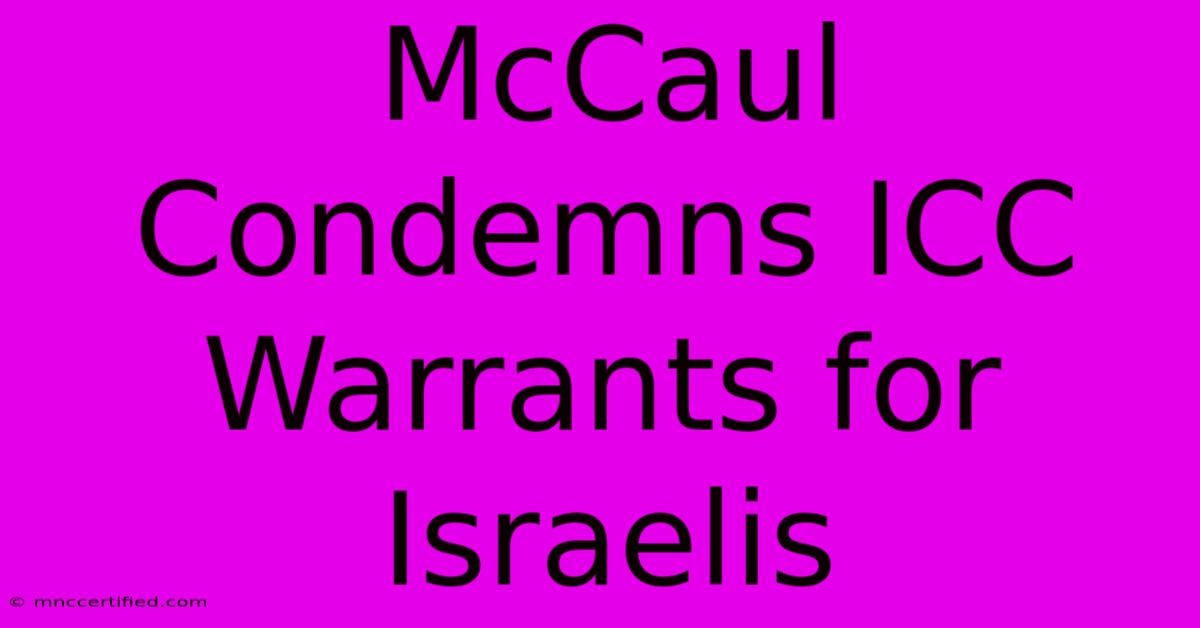McCaul Condemns ICC Warrants For Israelis

Table of Contents
McCaul Condemns ICC Warrants for Israelis: A Deep Dive into the International Legal Dispute
Representative Michael McCaul's strong condemnation of the International Criminal Court's (ICC) warrants for Israeli officials has ignited a firestorm of debate regarding international law, Israeli-Palestinian conflict, and US foreign policy. This article delves into the intricacies of the situation, examining McCaul's statements, the ICC's rationale, and the broader geopolitical implications.
Understanding the ICC Warrants
The ICC issued arrest warrants for several Israeli officials, alleging war crimes related to the Israeli occupation of Palestinian territories. These allegations are serious and involve potential violations of international humanitarian law. The specifics of the accusations remain complex and are subject to ongoing legal processes. It is crucial to note that these are allegations, and the individuals involved are presumed innocent until proven guilty. The ICC's jurisdiction is a matter of ongoing contention, particularly among nations that are not party to the Rome Statute, which established the court.
McCaul's Response and the US Position
Representative McCaul, a prominent Republican and Chairman of the House Foreign Affairs Committee, vehemently denounced the ICC warrants. He characterized the warrants as an attack on Israel and an abuse of the ICC's authority. His statement reflects a broader stance within the US government, which has consistently opposed the ICC's investigations into Israeli actions. The US argues that the ICC lacks jurisdiction in this matter and that its actions undermine peace efforts. McCaul's condemnation underscores the strong US commitment to supporting Israel and its concerns about the ICC's perceived bias.
Key Aspects of McCaul's Condemnation:
- Sovereignty Violation: McCaul likely framed the ICC's actions as a violation of Israel's sovereignty, a key argument used by nations opposed to ICC jurisdiction.
- Anti-Israel Bias: The claim of anti-Israel bias within the ICC is a recurring theme in US criticisms. This allegation points to a perceived imbalance in the court's focus.
- Undermining Peace Efforts: The argument that ICC investigations hinder peace processes is frequently employed to oppose its actions. This suggests that pursuing legal avenues detracts from diplomatic resolutions.
The International Legal Context: A Complex Web
The legal complexities surrounding the ICC warrants are significant. The court's jurisdiction is a contested issue, with many nations questioning its legitimacy and impartiality. The debate centers on:
- Jurisdiction: The ICC's jurisdiction hinges on the Rome Statute, which only certain nations have ratified. The US is not a signatory. This leads to questions of whether the court has the authority to investigate actions by non-member states.
- Impartiality: Critics argue that the ICC exhibits bias in its investigations, focusing disproportionately on certain states while ignoring others. This perceived imbalance undermines the court's credibility.
- Political Implications: The ICC's decisions have significant geopolitical ramifications. The warrants against Israeli officials have exacerbated tensions in the already volatile Israeli-Palestinian conflict.
The Road Ahead: Potential Consequences and Future Actions
The ICC's warrants and McCaul's subsequent condemnation highlight the deep divisions surrounding international law and the Israeli-Palestinian conflict. The situation's consequences could include:
- Increased Tensions: The warrants are likely to heighten tensions in the region, potentially jeopardizing fragile diplomatic efforts.
- Further Legal Challenges: Expect legal challenges to the warrants and intense diplomatic maneuvering from involved parties.
- Impact on US-ICC Relations: The US's continued opposition to the ICC is likely to further strain relations between the US and the international court.
The situation demands careful consideration of international law, political realities, and the human rights aspects of the Israeli-Palestinian conflict. Finding a path forward requires a commitment to dialogue, respect for international law, and a willingness to address the root causes of the conflict. The coming months will be crucial in determining the trajectory of this complex and sensitive international legal dispute.
Keywords: McCaul, ICC, International Criminal Court, Israel, Palestine, war crimes, arrest warrants, international law, US foreign policy, Israeli-Palestinian conflict, Rome Statute, sovereignty, geopolitics, human rights.

Thank you for visiting our website wich cover about McCaul Condemns ICC Warrants For Israelis. We hope the information provided has been useful to you. Feel free to contact us if you have any questions or need further assistance. See you next time and dont miss to bookmark.
Featured Posts
-
E Coli Beef Recall Nationwide Shipment
Nov 22, 2024
-
India Vs Australia Gavaskar Trophy Live Score Update
Nov 22, 2024
-
Three Teams Justin Fields Should Target
Nov 22, 2024
-
Gatwick Airport Evacuation Security Incident
Nov 22, 2024
-
Valley Ridge Investment Partners
Nov 22, 2024